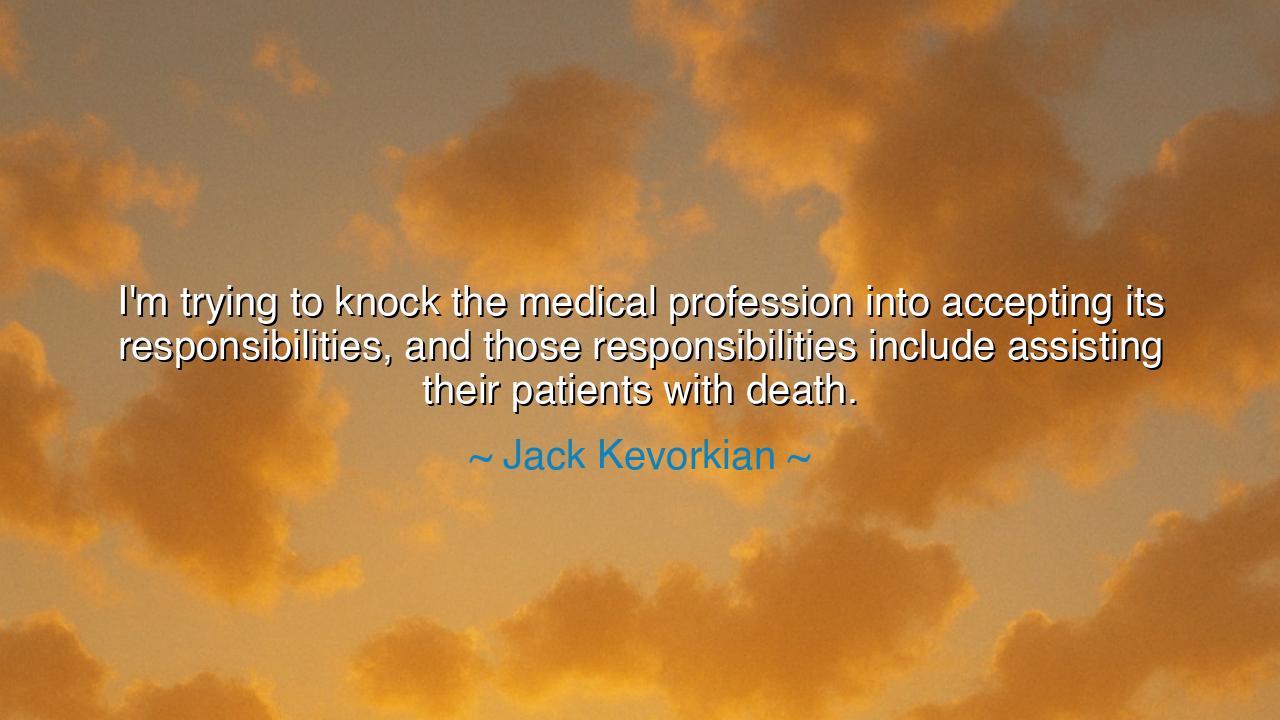
I'm trying to knock the medical profession into accepting its
I'm trying to knock the medical profession into accepting its responsibilities, and those responsibilities include assisting their patients with death.






The words of Jack Kevorkian, when he declared, “I’m trying to knock the medical profession into accepting its responsibilities, and those responsibilities include assisting their patients with death,” are as daring as they are profound. They arise from the voice of a man who dared to challenge one of the most sacred boundaries in human life — the right to determine the moment and manner of one’s own death. Though controversial, his words strike at an ancient question that has echoed through the halls of philosophy, faith, and medicine alike: what does it mean to heal, and what does it mean to help? Kevorkian’s cry was not born of cruelty, but of compassion — a belief that mercy can sometimes mean release, and that the duty of the physician is not merely to preserve life, but to ease suffering.
In the world of the ancients, death was not the enemy it has become in our modern age. The Greeks called it Thanatos, the peaceful twin of sleep. The Stoics believed that to die well was an art — that life’s dignity was not measured in its length, but in the grace with which it ended. Hippocrates, the father of medicine, vowed to do no harm — but he also taught that medicine’s true purpose is to bring relief. Kevorkian’s challenge, therefore, was a modern echo of that ancient wisdom: to remind physicians that compassion and courage are as vital to their craft as knowledge. In his eyes, to abandon a dying patient to agony for the sake of principle was not healing, but betrayal.
Kevorkian’s crusade arose in an era when medical science had learned to delay death, but not always to diminish suffering. Machines could keep hearts beating long after the spirit had withdrawn; tubes could feed a body whose mind had gone silent. To him, such prolongation without peace was a perversion of mercy — a triumph of technology over humanity. He stood before the world and said what few dared to say: that sometimes, to help a patient live with dignity is to help them die with dignity. His defiance of law and custom earned him both scorn and reverence, for he forced society to confront what it had long hidden — the truth that the end of life, too, requires the art of care.
History remembers other such rebels of conscience. In ancient Rome, the philosopher Seneca, condemned to death by Nero, accepted his fate with calm dignity, opening his veins in a warm bath surrounded by friends. To Seneca, death was not horror, but completion — the final act of reason, when one may choose to end pain and uphold self-respect. Kevorkian, too, saw death not as defeat, but as a transition guided by compassion. He sought not to destroy life, but to restore autonomy — to return the power of choice to those whom disease had rendered powerless.
Yet his words also carry a warning. In the wrong hands, mercy can become cruelty; in the name of compassion, injustice can be done. Thus, Kevorkian’s vision requires not recklessness, but wisdom and restraint. To assist in death is not to wield power, but to bear sacred responsibility — to discern when suffering has surpassed healing, and when love must take the form of letting go. The ancients taught that every act of power must be tempered by virtue, and so too must the doctor’s hand be guided not by convenience, but by conscience.
The deeper lesson of Kevorkian’s words is not about medicine alone, but about the human condition. We fear death because we have forgotten how to see it — not as the enemy, but as the companion that gives meaning to life. The physician who accepts death as part of his duty does not betray life; he honors its wholeness. To deny the dying their peace is to deny that life’s journey, like all things under heaven, must one day find its rest. The courage to speak of death is, in truth, the courage to face life without illusion.
So let those who hear these words remember: to care for the dying is as sacred as to heal the living. Let doctors, and all who serve humanity, remember that mercy may wear many faces — sometimes a healing hand, sometimes a listening ear, and sometimes the quiet strength to say, “It is enough.” For the measure of compassion is not in how tightly we hold to life, but in how gently we release it when its purpose is fulfilled. And may we all learn, as Kevorkian taught, that to embrace death with understanding is not to diminish life — but to make it, at last, complete.






AAdministratorAdministrator
Welcome, honored guests. Please leave a comment, we will respond soon